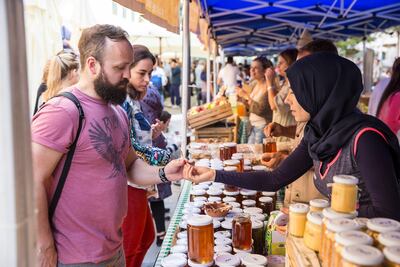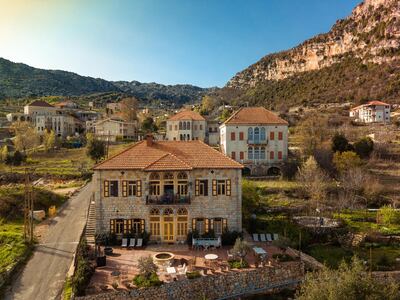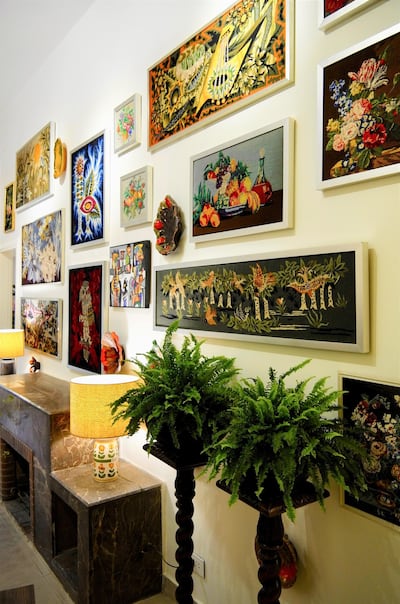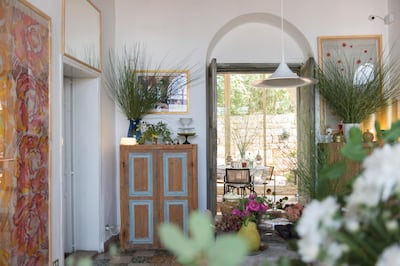Kamal Mouzawak's is a simple motto: make food, not war. A celebrated chef, restaurateur and hotelier, Mouzawak is also a humanist and food activist, and the founder of Souk El Tayeb, a food co-operative that encompasses several farmers' markets, restaurants and accommodation across Lebanon. The initiative started exactly 15 years ago, in June 2004, as a Saturday market in the parking lot of the Centre Sofil mixed-use complex in Beirut.
This has sparked a month of celebration at Souk El Tayeb, which is both the name of the company Mouzawak founded and of the farmers' market where it all began. I start to ask him if it was an initiative he created to help women, but he stops me short. "I don't believe in sexism because there can also be reverse sexism; this was to help farmers."
He concedes that farmers tend to be “mostly men” and cooking is “typically associated with women”. Consequently, when he started opening community kitchens – the first being Tawlet, now a highly successful common-table restaurant in Beirut – he naturally began helping more women. The restaurant offers a different menu each day, set by a woman, featuring dishes from the region she comes from.
Today, some of these cooks, who have been with Mouzawak since the beginning, have become celebrities in their own right. Case in point: Oum Ali from the village of Majdelzoun in south Lebanon, has come to be known as the bread queen, having opened her namesake bakery in Beirut; and Nada Saber from the Beqaa Valley, who used to make mouneh (preserves made from fruits, vegetables, herbs, flowers and animal byproducts) from home for her husband and children, now travels the world teaching people how to prepare authentic Lebanese food.
When I chat to Mouzawak over the phone, he is in Beit Douma, the 19th-century countryside villa in the northern town of Douma in Lebanon that his partner and he restored and turned into a bed and breakfast. He tells me that “nature is exploding” around him as we speak, and that the yellow broomstick bushes are in bloom, filling the air with their distinct scent.
We speak on a Monday – the day that Mouzawak cooks a week’s worth of food for his ageing mother, who isn’t able to make the delicious dishes she taught her son for herself any more. He is in the midst of preparing chicken with a special sauce, moutabel and mujaddara, with lentils and rice – dishes that represent the complete food pyramid.
Much like the dishes he'll hand-deliver to his mum later, good nutrition and local ingredients are part of the food movement Mouzawak has helped pioneer. His aim is to unify humanity through nourishment, as opposed to them being separated by politics as is often the way of the modern world. Further than this declaration, Mouzawak doesn't believe in talking about religion or politics; food is his real passion, he says, gently dismissing the "activist" tag that many others have given him. Accordingly, the elegant and soft-spoken chef is equally at home ordering a panino on the streets of Florence as he is having breakfast in one of Berlin's famous cafes. In his native Lebanon, he can often be spotted perusing local ingredients from street markets for his menus.
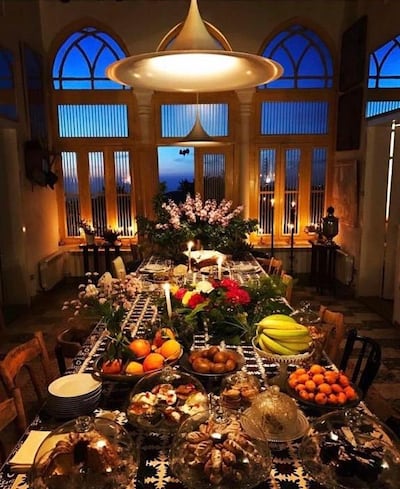
At Beit El Hamra, a 1950s-style villa-turned-B&B that Mouzawak opened to guests this month on Baalbak Street in Beirut, the scent of gardenias fills the air – soon to be replaced by the magnificent aromas of a home-cooked meal emanating from the kitchen. Mouzawak is happy that visitors feel at home in his properties and says about Beit Al Hamra’s opening weekend: “Guests were spending the whole day and night in the house, going to their room to rest and then coming to the garden to have a coffee, and back again to have lunch. They treated it like it was their own house, which I really found wonderful.”
That “domestic dimension” is fundamental to the hotelier. “We forget that hospitality begins at home and home is the model of hospitality – the food and beverage industry has gone into very strict rules and forgotten about being a home away from home.” Accordingly, just as the produce used in Mouzawak’s restaurants and the chefs who prepare them all hail from around Lebanon, so are the interiors of each Souk El Tayeb property crafted from local materials.
Finally, I ask Mouzawak what one should pack to visit one of his retreats. “That’s the best question to ask me, because I travel very light,” he says, admitting that he can be on the road for two months and require just a cabin bag. “Just pack light – in your heart and on your shoulders. Make space; if there is no space in your mind and heart and luggage, you are just stuffed.” Save a sanguine version of that feeling for the delicious food instead.

